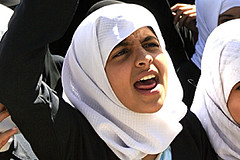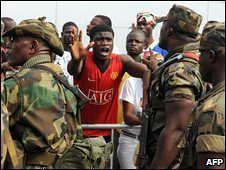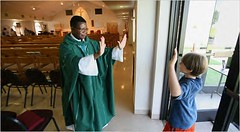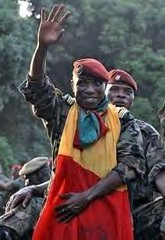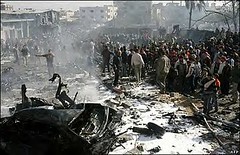
Somali guerrilla fighters of the al-Shabaab organization that is struggling to remove the US-backed occupation of their country.
Originally uploaded by Pan-African News Wire File Photos
Big News Network.com
Wednesday 31st December, 2008
Ethiopian troops have begun to pull out of Somalia.
Initially, the troops had signaled their withdrawal for Wednesday, but the Somali government said they had been convinced to stay until the first week of January.
The Somali government has been concerned a power vacuum will be created when the Ethiopians leave.
An estimated 3,000 Ethiopian troops have been in Somalia since helping to expel Islamist rebels from the capital Mogadishu two years ago.
The rebels are now in control of large parts of southern Somalia.
Ethiopia 'packing up in Somalia'
Many Somalis resent the presence of the Ethiopian troops
Ethiopian troops have started to prepare to leave Somalia on the day they were supposed to complete their withdrawal, witnesses say.
The troops were packing mattresses, personal belongings and loading trucks with military supplies, they said.
But there was no sign that the Ethiopians had started to leave the capital Mogadishu, as they have promised to do by the end of the year.
Some fear the Ethiopian withdrawal could lead to a power vacuum.
But others say it could make it easier for a new government to be formed, including moderate Islamist forces.
The Ethiopian intervention to help government forces oust Islamists from the capital two years ago was deeply unpopular with many Somalis.
Various Islamist and nationalist groups now control much of southern Somalia. Government forces only control parts of Mogadishu and the town of Baidoa.
But hardline Islamist leader Sheik Muktar Robow said his forces would continue to fight government troops even after the Ethiopian troops leave.
"We will not stop fighting even if the Ethiopian troops withdraw because our aim is to implement Islamic law across Somalia," he said.
President Abdullahi Yusuf this week resigned after a power-struggle with his prime minister, partly over whether to negotiate with moderate Islamists.
Fresh shelling kills civilians in Mogadishu
12/30/2008 3:38:00 PM
Shabelle: SOMALIA
MOGADIHSU (Sh. M. Network)-At least 10 people have been killed and dozens wounded Tuesday after government and Ethiopian soldiers shelled Bakaro market in Mogadishu, witnesses said.
"A mortar shell landed in my restaurant and six people died instantly,"said Ali Hassan the owner of the restaurant.
"Nine civilians were seriously injured,"he said.
The Shelling came after Al-shabab insurgent group fired mortars to the presidential palace where Ethiopian and government troops are based.
The government and Ethiopian troops fired back to the heavily populated market which caused the civilian deaths.
Al-shabab spokesman, Sheik Muqtar Robow Abu Manoor vowed they will continue the fighting until the Ethiopian soldiers withdraw from Somalia.
Abu Mansoor told Shabelle Media Network that the fighting in central regions of Somalia is between what he called factions under the name of religious groups that Ethiopia armed them and his group.
Earlier on Tuesday Ethiopian soldiers arrested dozens of Somali teenagers in Mogadishu and it is not known why the Ethiopian soldiers detained them.
Residents say Ethiopian troops with two tanks entered in parts of Wardhigley district in Mogadishu and took the teenagers with them to the presidential palace.
Ethiopia recently announced its intention to withdraw its troops which entered Somalia in December of 2006 in order to bolster its own security concerns and help the TFG gain stronger governing leverage in the country.
However, Human Rights Watch issued a report on 7 December 2008 saying that Ethiopia’ intervention has fueled new attacks and bombings that have encouraged the conflict to spread into neighboring regions and across borders.
Human Rights Watch accused the rival sides in Mogadishu of human rights violations and committing war crimes.
Shabelle Media Network
By: Ahmednor Mohamed Farah
Somalis killed as Islamists clash
Al-Shabab is fighting a relatively new rival Islamist militant group
At least 40 people have died in clashes between Islamist groups vying to control key towns in central Somalia.
Fifty others were wounded as a self-styled moderate Islamist group, Ahlu Sunna Waljamaca, continued to battle militants from the hardline al-Shabab.
In the capital, Mogadishu, 10 people died as insurgents fired mortars at the bases of government troops.
Monday's violence came as Somalia's president quit, adding to the chaos as Ethiopian troops prepare to withdraw.
Ahlu Sunna Waljamaca, a relatively new Islamist group, has declared a holy war on al-Shabab, blaming it for the bloodshed in Somalia.
It seized two towns in central Somalia over the weekend, triggering fierce clashes.
Various Islamist and nationalist groups control most of southern Somalia. Government forces only control parts of the capital, Mogadishu, and the town of Baidoa.
The bloodletting continued as Somalia's President Abdullahi Yusuf quit following a power struggle with the prime minister.
The pair had clashed in recent months over attempts to negotiate a peace deal with moderates in the Islamist-led armed opposition.
In 2006, President Yusuf made the unpopular decision to call in troops from neighbouring Ethiopia to prop up his fragile administration but the move has failed to quell the Islamist insurgency.
Ethiopian troops are due to pull out this week, raising fears of a power vacuum in a country that has not had an effective national government since 1991.
Fighting between the Ethiopia-backed government and the insurgents has left one million people homeless and much of Mogadishu deserted.
Somalia: Somali militia fighting claims five lives -witnesses
Mon. December 29, 2008 02:39 am
By Bonny Apunyu
(SomaliNet) Witnesses said five people were killed on Sunday in fighting between Somalia's radical Islamist Shebab insurgents and local militia over the control of a town in the country's central region.
According to reports, the local militia, a moderate Islamist group known as Ahlu-Suna, attacked the Shebab fighters who had seized control of Dhusamareb, some 400 kilometres (250 miles) northwest of the capital Mogadishu.
"Five people were killed and at least nine others were wounded," said local resident Mohamud Ibrahim.
A local elder who declined to be named confirmed the death toll, adding that they were trying to negotiate an end to the clashes.
"We are trying to mediate an end to the fighting but it is very difficult because the leaders of the warring groups are not known yet," he said.
He said the fighting was dying down.
On Saturday, at least 10 people were killed in clashes between the two groups over the control of Gurael, another town in central Somalia.
The Shebab, a militant wing of an Islamist movement ousted by Ethiopia-backed government forces in early 2007, have in recent months retaken much of the territory they lost to the joint forces.
They now control much of southern and central Somalia, except Mogadishu and Baidoa, the seat of the transitional government.
The lawless Horn of Africa country has lacked a central government since the 1991 ouster of dictator Mohamed Siad Barre. - Sapa-AFP
Sudan president: mobilization of naval fleets in Somali coast complicates situation
12/31/2008 5:42:00 AM
Shabelle: SOMALIA
KHARTOUM (Sh. M. Network) -- Sudanese President Omar al-Bashir on Tuesday said the mobilization of naval fleets in the Somali coast would complicate the situation in Somalia and the region as a whole.
"The mobilization of fleets will not solve the problem.... It is feared that the presence of an international military will be a pretext of threat to the stability of the region," he said in a speech at the opening session of the Sanaa Gathering, which is made up of Sudan, Yemen, Ethiopia and Somalia.
He said the phenomenon of piracy on the Somali coast is the natural result of the deteriorating situation in Somalia, and "the elimination of the phenomenon of piracy depends on resolving the Somali problem and reaching a lasting peace and stability there."
Bashir stressed the importance of a conciliatory solution to the problem of Somalia, and warned that the situation in Somalia, what he described as "chaos," will affect the stability of the whole region.
He called on the international community to support the efforts of the African Union and the Arab League which aimed at finding a peaceful settlement to the conflicts in Somalia.
Somalia, which has not had a functioning central government since 1991, has witnessed an upsurge in fighting this year, which has led to massive humanitarian suffering and widespread displacement.
The waters off the Somali coasts are considered to be some of the world's most dangerous areas as pirates have hijacked and attacked dozens of ships this year.
According to the London-based International Maritime Bureau, at least 109 ships have been attacked there this year. Fourteen ships are currently held for ransom, including a Saudi supertanker Sirius Star and a Ukrainian cargo ship Faina, which was carrying 32 armored tanks.
The pirates' focus has been the Gulf of Aden, between Somalia and Yemen, where 20,000 merchant ships a year pass on the way in and out of the Suez Canal, the quickest route from Asia to Europe and the Americas.
Since June, the UN Security Council has adopted four resolutions calling on all countries to take part in patrolling gulf and waters off Somalia. The latest UN authorization allowed countries to "undertake all necessary measures in Somalia, including in its airspace" to stop the pirates.
The authorized but voluntary international intervention includes naval vessels from China, Denmark, Germany, India, Italy, Russia and the United States -- which are in concerted vigilance over the seaway from the gulf to the Suez Canal, which is the shortest route connecting Mediterranean and the Indian Ocean.
Shabelle Media Network
Source: Xinhua
Fighting starts in Gedo region
12/31/2008 8:46:00 AM
Shabelle: SOMALIA
LUUQ ( Sh. M. Network )-Heavy fighting between the Islamist insurgents and Ethiopian troops has begun at a around Garsow checkpoint and the bridge of Luuq town in Gedo region last night, Shabelle correspondent Ahmed Omar reported
The fighting has started after the Islamist insurgent fighters attacked two Ethiopian military bases those have checkpoint in the town using heavy weapons including mortar shells and machine guns and fighting has been going on for hours in the town as reported.
Islamist insurgent official has claimed the responsibility of the attack and said that they were behind that attack which was targeted the Ethiopian troops’ military bases in Gedo region and he added they have inflicted more casualties to the Ethiopian troops in over there.
No casualties have been reported until now as the reports from Gedo region say and the fighting between both Islamists and the Ethiopian troops in Luuq town has been stopped and the situation of the town is calm now.
The Ethiopian troops have been in Gedo region since eight years and were working with the administration of that region and but this was the first attack that Ethiopian troops those have bases in Luuq town targeted by Islamist insurgents in Gedo region who are greatly against the foreign troops’ presence and government policy.
Shabelle Media Network

